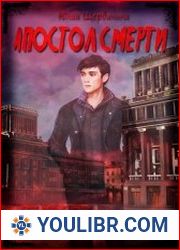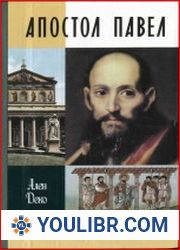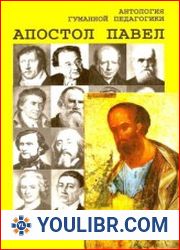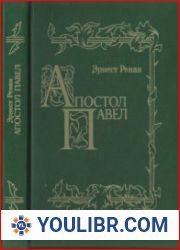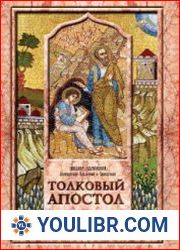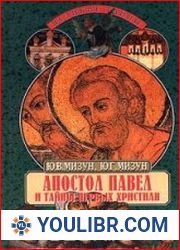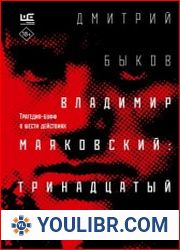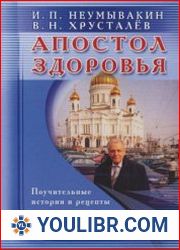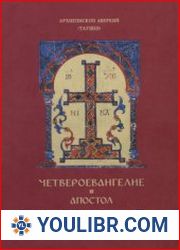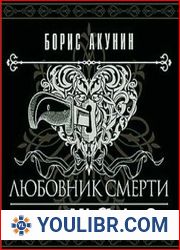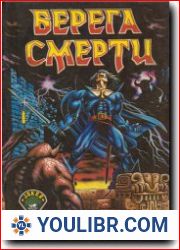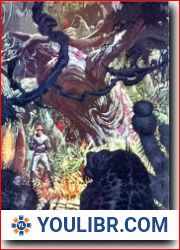
BOOKS - SCIENCE FICTION - Апостол Смерти

Апостол Смерти
Author: Юлия Щербинина
Year: 2021
Format: RTF/FB2
File size: 10.2 MB
Language: RU
Year: 2021
Format: RTF/FB2
File size: 10.2 MB
Language: RU
Nikita was never the favorite of fate. Loneliness, poverty, the struggle for survival in the far north, and eventually death in an accident. It would seem that this is it, deliverance, but after death it only gets worse. Forty days pass, and now, behind a nondescript grave, there is a huge world ahead, full of living people, and no one sees a ghost wandering around the city. There is no more body, but reason continues to live, feelings haunt. What next? Who will respond to the call for help in such an "eccentric" situation? Perhaps in the ancient diary of a necromancer there is a way to solve the problem...
本書分為四個部分:第一部分:評論家的任務,第二部分:詩意知識,第三部分:哲學知識和第四部分:宗教知識。《批判詩歌哲學宗教任務》:評論家的任務:技術進化時代的詩學,哲學和宗教的詳細情節描述簡介:在這本令人反思的書中,作者深入探討了技術,哲學,詩歌和宗教之間的復雜關系,探討了現代評論家在駕馭現代知識的復雜景觀中的關鍵作用。隨著技術以前所未有的速度繼續發展,理解和解釋技術過程的個人範式的需求對人類的生存變得越來越重要。這本書深入分析了文學,哲學和宗教之間不斷變化的界限,邀請讀者踏上旅程,重新審視他們對數字時代這些學科的理解。第一部分:評論家的任務第一章:親密讀者的出現作者首先研究了第二次世界大戰後時代評論家任務的轉變,強調了親密閱讀作為解釋文學作品的基本技能的重要性。他們探討了近距離閱讀者的價值觀如何隨著時間的推移而演變,適應不斷變化的技術格局及其對我們對現實的看法的影響。
Сюжет книги «Апостол Смерти» («Апостол смерти») [Имя автора] - это захватывающая и захватывающая история, которая углубляется в темы эволюции технологий, личных парадигм и выживания человечества. Действие происходит в постапокалиптическом мире, история рассказывает о путешествии Никиты, молодого человека, который был одарен силой воскресения после своей безвременной смерти. В начале истории Никита показан одиноким и обедневшим человеком, который пытается свести концы с концами в суровом климате далекого севера. Несмотря на все свои усилия, он встречает неудачный конец в аварии, оставляя его похороненным в невзрачной могиле. Однако его путешествие здесь не заканчивается, поскольку вскоре он оказывается пробудившимся из мёртвых, преследуемый воспоминаниями о своей прошлой жизни и тоской по человеческой связи. Так как никто не может его увидеть или услышать, Никите остается бродить по городу как призраку, ища способ вернуться в землю живых. В поисках ответов он натыкается на древний дневник, принадлежащий некроманту, в котором может находиться ключ к его воскресению. O enredo de «O Apóstolo da Morte» é uma história emocionante e emocionante que se aprofunda sobre a evolução da tecnologia, os paradigmas pessoais e a sobrevivência da humanidade. Em um mundo pós-apocalíptico, a história conta a viagem de Nikita, um jovem que foi dotado do poder da ressurreição após sua morte prematura. No início da história, Nikita é mostrado como um homem solitário e pobre que tenta chegar ao fim em um clima severo de um norte distante. Apesar de todos os seus esforços, ele encontra um mau fim no acidente, deixando-o enterrado numa sepultura. No entanto, a sua viagem não termina aqui, porque logo ele se encontra despertado dos mortos, perseguido pelas memórias de sua vida passada e pela afinidade humana. Como ninguém pode vê-lo ou ouvi-lo, o Nikite fica a circular pela cidade como um fantasma, à procura de uma maneira de regressar à terra dos vivos. Em busca de respostas, ele se depara com um diário antigo que pertence a um necromante que pode ter a chave para a sua ressurreição. "Ölüm Havarisi" kitabının konusu ("Ölüm Havarisi") [Yazarın adı], teknolojinin evrimi, kişisel paradigmalar ve insanlığın hayatta kalması temalarını inceleyen büyüleyici ve heyecan verici bir hikaye. Kıyamet sonrası bir dünyada geçen hikaye, zamansız ölümünden sonra diriliş gücü ile yetenekli genç bir adam olan Nikita'nın yolculuğunu takip ediyor. Hikayenin başlarında Nikita, uzak kuzeydeki sert iklimde bir araya gelmek için mücadele eden yalnız ve yoksul bir adam olarak gösteriliyor. En iyi çabalarına rağmen, bir kazada kötü bir sonla karşılaşır ve onu belirsiz bir mezara gömer. Bununla birlikte, yolculuğu burada bitmiyor, kısa süre sonra kendini ölümden uyanmış, geçmiş yaşamının hatıraları ve insan bağlantısına duyulan özlemle dolu buluyor. Kimse onu göremediği veya duyamadığı için, Nikita şehri bir hayalet gibi dolaşmaya, yaşayanların ülkesine dönmenin bir yolunu aramaya bırakılır. Cevaplar ararken, dirilişinin anahtarını tutabilecek bir necromancer'a ait eski bir günlüğe rastlar. حبكة كتاب «رسول الموت» («رسول الموت») [اسم المؤلف] هي قصة رائعة ومثيرة تتعمق في موضوعات تطور التكنولوجيا والنماذج الشخصية وبقاء البشرية. تدور أحداث القصة في عالم ما بعد نهاية العالم، وتتبع رحلة نيكيتا، الشاب الموهوب بقوة القيامة بعد وفاته المفاجئة. في وقت مبكر من القصة، يظهر نيكيتا كرجل وحيد وفقير يكافح من أجل تغطية نفقاته في المناخ القاسي في أقصى الشمال. على الرغم من بذل قصارى جهده، إلا أنه يواجه نهاية سيئة في حادث، تاركًا إياه مدفونًا في قبر لا يوصف. ومع ذلك، فإن رحلته لا تنتهي هنا، حيث سرعان ما يجد نفسه مستيقظًا من الموتى، مسكونًا بذكريات حياته الماضية والتوق إلى التواصل البشري. نظرًا لأنه لا يمكن لأحد رؤيته أو سماعه، تُرك نيكيتا للتجول في المدينة كشبح، بحثًا عن طريقة للعودة إلى أرض الأحياء. فهو يبحث عن اجوبة، فيعثر على مذكرات قديمة تخص مستحضر الارواح، قد تحمل مفتاح قيامته. 아래는 교육에 사용되는 가장 일반적인 유형의 기술 목록과 그 장단점입니다. LMS (arning Management Systems): LMS는 온라인 과정을 관리하고 제공하기위한 소프트웨어 응용 프로그램 교육자들은 코스 자료, 과제 및 평가를 게시하고 학생의 성취 및 참여를 추적 할 수 있습니다. 혜택에는 교직원과 학생 모두에게 효율성, 조직 및 접근성 향상이 포함됩니다. 단점은 제한된 사용자 정의 옵션과 잠재적 인 기술적 문제를 포함 할 수 있습 2. 온라인 협업 도구: 이 도구를 통해 학생들은 프로젝트를 함께 진행하고 아이디어를 원격으로 공유 혜택 중에는 학생 협력 및 커뮤니케이션 증가, 수업 시간 이외의 프로젝트 작업 능력이 있습니다. 단점은 기술적 인 문제 나 공동체 의식을 형성하는 데 어려움이있을 수 있습니다 3. OER (Open Education Resources): OER은 교육자, 학생 및 자기 학습자를 포함한 모든 사람이 사용할 수있는 무료 교육 자료입니다. 혜택 중에는 비용 절감과 양질의 교육 콘텐츠에 대한 액세스 증가가 있습니다. 단점은 제한된 가용성과 리소스 선별 및 검토의 필요성을 포함 할 수 있습니다. 4. 게임 화: 교육과 같은 비 게임 상황에서 게임 요소를 사용하여 참여와 동기 부여를 높입니다. 참여와 즐거움 향상, 재료 보유 향상 등의 이점이 있습니다. 단점은 과도하게 사용하거나 불충분 한 학습 깊이를 포함 할 수 있습니다. 5. 가상 현실 (VR) 및 증강 현실 (AR): VR 및 AR 기술은 몰입 형 대화식 학습 경험을 가능하게합니다. 本「死の使徒」(「死の使徒」)[著者の名前]のプロットは、技術の進化のテーマを掘り下げる魅力的でエキサイティングな物語です、個人的なパラダイムと人類の生存。黙示録の世界を舞台にした物語は、彼の不時着の死の後に復活の力を与えられた青ニキータの旅を追っています。物語の初期に、ニキータは孤独で貧しい男として描かれ、極北の過酷な気候の中で決着をつけようと奮闘している。しかし、彼の旅はここで終わることはありません、彼がすぐに死者から目を覚まし、彼の過去の人生の思い出と人間のつながりへの憧れに悩まされました。誰も彼を見ることも聞くこともできないので、ニキータは幽霊のように街を歩き回り、生きている土地に戻る方法を探しています。答えを求めて、彼は彼の復活の鍵を握るかもしれない壊死者に属する古代の日記につまずきます。 עלילת הספר ”שליח המוות” (”שליח המוות”) [ שמו של הסופר ] הוא סיפור מרתק ומרגש המתעמק בנושאי התפתחות הטכנולוגיה, הפרדיגמות האישיות והישרדות האנושות. סט בעולם פוסט-אפוקליפטי, הסיפור עוקב אחר מסעו של ניקיטה, בחור צעיר שהיה מחונן בכוחה של תחיית המתים לאחר מותו בטרם עת. בתחילת הסיפור, ניקיטה מוצג כאדם בודד ועני הנאבק לגמור את החודש באקלים הקשה בצפון הרחוק למרות מיטב מאמציו, הוא פוגש סוף רע בתאונה, עם זאת, מסעו אינו מסתיים כאן, כפי שהוא מוצא את עצמו במהרה התעורר מן המתים, רדוף על ידי זכרונות של חייו הקודמים וגעגועים לקשר אנושי. מכיוון שאף אחד לא יכול לראות או לשמוע אותו, ניקיטה נשארה לשוטט בעיר כמו רוח רפאים, מחפש דרך לחזור לארץ החיים. בחיפוש אחר תשובות, הוא נתקל ביומן עתיק השייך לחוקר אוב, אשר עשוי להכיל את המפתח לתחייתו. Fabuła książki „Apostoł Śmierci” („Apostoł Śmierci”) [Imię Autora] jest fascynującą i ekscytującą historią, która zagłębia się w tematy ewolucji technologii, paradygmatów osobistych i przetrwania ludzkości. Ustawiony w postapokaliptycznym świecie, opowieść następuje po podróży Nikity, młodego człowieka, który został obdarzony mocą zmartwychwstania po przedwczesnej śmierci. Na początku opowieści, Nikita jest pokazany jako samotny i zubożały człowiek walczący o to, aby zakończenie spotkać w surowym klimacie dalekiej północy. Jednak jego podróż nie kończy się tutaj, gdy wkrótce znajdzie się obudzony z martwych, nawiedzony przez wspomnienia z jego przeszłego życia i tęsknoty za ludzkim połączeniem. Ponieważ nikt go nie widzi ani nie słyszy, Nikita ma wędrować po mieście jak duch, szukając sposobu na powrót do krainy żywych. Szukając odpowiedzi, natknął się na starożytny pamiętnik należący do nekromanta, który może trzymać klucz do jego zmartwychwstania. The plot of the book 'Апостол Смерти' (Apostle of Death) by [Author Name] is a thought-provoking and captivating tale that delves into the themes of technology evolution, personal paradigms, and the survival of humanity. Set in a post-apocalyptic world, the story follows the journey of Nikita, a young man who has been gifted with the power of resurrection after his untimely death. As the story begins, Nikita is shown to be a lonely and impoverished individual struggling to make ends meet in the harsh climate of the far north. Despite his best efforts, he meets an unfortunate end in an accident, leaving him buried in a nondescript grave. However, his journey does not end here as he soon finds himself awakened from the dead, haunted by the memories of his past life and the longing for human connection. With no one able to see or hear him, Nikita is left to wander the city as a ghost, searching for a way to return to the land of the living. In his quest for answers, he stumbles upon an ancient diary belonging to a necromancer, which may hold the key to his resurrection. La trama del libro «apóstol de la muerte» [nombre del autor] es una historia emocionante y emocionante que profundiza en los temas de la evolución de la tecnología, los paradigmas personales y la supervivencia de la humanidad. Ambientada en un mundo postapocalíptico, la historia narra el viaje de Nikita, un joven que fue dotado con el poder de la resurrección tras su prematura muerte. Al principio de la historia, Nikita se muestra como un hombre solitario y empobrecido que intenta llegar a fin de mes en el duro clima del lejano norte. A pesar de todos sus esfuerzos, se encuentra con un final desafortunado en el accidente, dejándolo enterrado en una tumba no transparente. n embargo, su viaje no termina aquí, ya que pronto se encuentra despertado de los muertos, plagado de recuerdos de su vida pasada y anhelo de conexión humana. Como nadie puede verlo ni oírlo, Nikita se queda vagando por la ciudad como un fantasma, buscando una manera de volver a la tierra de los vivos. En busca de respuestas, tropieza con un antiguo diario perteneciente a un necromante en el que puede estar la clave de su resurrección. L'histoire du livre « L'apôtre de la mort » est une histoire passionnante et passionnante qui s'approfondit dans les thèmes de l'évolution de la technologie, des paradigmes personnels et de la survie de l'humanité. L'action se déroule dans un monde post-apocalyptique, l'histoire raconte le voyage de Nikita, un jeune homme qui a été doué du pouvoir de la résurrection après sa mort prématurée. Au début de l'histoire, Nikita est montré comme un homme solitaire et appauvri qui essaie de joindre les deux bouts dans le climat rude du nord lointain. Malgré tous ses efforts, il rencontre une fin malheureuse dans l'accident, le laissant enterré dans une tombe indestructible. Mais son voyage ne se termine pas ici, car il se retrouve bientôt réveillé d'entre les morts, hanté par les souvenirs de sa vie passée et par l'angoisse du lien humain. Comme personne ne peut le voir ou l'entendre, Nikita reste errant dans la ville comme un fantôme, cherchant un moyen de retourner sur la terre des vivants. À la recherche de réponses, il tombe sur un ancien journal appartenant à un nécromancien qui peut contenir la clé de sa résurrection. Die Handlung des Buches „Apostel des Todes“ („Apostel des Todes“) [Name des Autors] ist eine spannende und spannende Geschichte, die sich mit den Themen Technologieentwicklung, persönliche Paradigmen und Überleben der Menschheit befasst. Die Handlung spielt in einer postapokalyptischen Welt, die Geschichte folgt der Reise von Nikita, einem jungen Mann, der nach seinem frühen Tod mit der Kraft der Auferstehung beschenkt wurde. Zu Beginn der Geschichte wird Nikita als einsamer und verarmter Mann gezeigt, der versucht, im rauen Klima des fernen Nordens über die Runden zu kommen. Trotz aller Bemühungen trifft er bei dem Unfall auf ein unglückliches Ende und lässt ihn in einem unscheinbaren Grab begraben. Seine Reise endet hier jedoch nicht, da er bald von den Toten erwacht ist, verfolgt von Erinnerungen an sein früheres ben und der Sehnsucht nach einer menschlichen Verbindung. Da niemand ihn sehen oder hören kann, bleibt Nikita wie ein Geist durch die Stadt wandern und sucht nach einem Weg, um in das Land der benden zurückzukehren. Auf der Suche nach Antworten stößt er auf ein uraltes Tagebuch eines Nekromanten, in dem sich möglicherweise der Schlüssel zu seiner Auferstehung befindet. La trama del libro «L'apostolo della morte» è una storia emozionante ed emozionante che approfondisce i temi dell'evoluzione della tecnologia, dei paradigmi personali e della sopravvivenza dell'umanità. svolge nel mondo post-apocalittico, la storia racconta il viaggio di Nikita, un giovane uomo dotato della forza della risurrezione dopo la sua morte prematura. All'inizio della storia Nikita è rappresentato da un uomo solo e povero che cerca di far quadrare le cose nel clima rigido di un lontano nord. Nonostante i suoi sforzi, incontra una brutta fine in un incidente, lasciandolo sepolto in una tomba ignobile. Ma il suo viaggio non finisce qui, perché presto si ritrova risvegliato dai morti, inseguito dai ricordi della sua vita passata e dal suo legame umano. Poiché nessuno può vederlo o sentirlo, Nikita rimane a vagare per la città come un fantasma, cercando un modo per tornare alla terra dei vivi. In cerca di risposte, si imbatte in un antico diario appartenente a un necromante che potrebbe contenere la chiave della sua risurrezione. pobierz plik pdf descargar archivo pdf download pdf file PDFファイルをダウンロード pdf dosyasını indir descarregar ficheiro pdf télécharger le fichier pdf pdf 파일 다운로드 تنزيل ملف pdf PDF-Datei herunterladen скачать файл PDF Scarica il file pdf download pdf file 下载 pdf 文件 להוריד קובץ PDF
Nikita was never the favorite of fate. Loneliness, poverty, the struggle for survival in the far north, and eventually death in an accident. It would seem that this is it, deliverance, but after death it only gets worse. Forty days pass, and now, behind a nondescript grave, there is a huge world ahead, full of living people, and no one sees a ghost wandering around the city. There is no more body, but reason continues to live, feelings haunt. What next? Who will respond to the call for help in such an "eccentric" situation? Perhaps in the ancient diary of a necromancer there is a way to solve the problem...
Nikita nunca foi o favorito do destino. A solidão, a pobreza, a luta pela sobrevivência no extremo norte, e a morte no acidente. Parece que aqui está a livrar-se, mas depois de morrer, só piora. Quarenta dias se passam, e aqui, atrás de um túmulo sem escrúpulos, há um mundo enorme, cheio de pessoas vivas, e ninguém vê um fantasma a vaguear pela cidade. O corpo já não existe, mas a razão continua, os sentimentos não dão descanso. E depois? Quem responderá a um chamado de ajuda numa situação tão «excêntrica»? Talvez o antigo diário do necromante tenha uma maneira de resolver o problema.
Nikita nunca fue el favorito del destino. Soledad, pobreza, lucha por sobrevivir en el extremo norte, y al final la muerte en un accidente. Parecería que aquí está, la liberación, pero después de la muerte sólo empeora. Pasan cuarenta días, y he aquí, a espaldas de una tumba invisible, hay un mundo enorme, lleno de gente viva por delante, y nadie ve a un fantasma vagando por la ciudad. Ya no hay cuerpo, pero la razón sigue viviendo, los sentimientos no dan descanso. ¿Qué sigue? ¿Quién responderá a la llamada de ayuda en una situación tan «excéntrica»? Tal vez en el antiguo diario del nigromante haya una manera de resolver el problema...
Никита никогда не был любимцем судьбы. Одиночество, бедность, борьба за выживание на крайнем севере, и в итоге гибель в аварии. Казалось бы, вот оно, избавление, но после смерти становится только хуже. Проходит сорок дней, и вот, за спиной невзрачная могила, впереди огромный мир, полный живых людей, и никто не видит блуждающего по городу призрака. Тела больше нет, но рассудок продолжает жить, чувства не дают покоя. Что дальше Кто откликнется на зов о помощи в столь »эксцентричной» ситуации Быть может, в древнем дневнике некроманта найдётся способ решить проблему…
Nikita non è mai stato il preferito del destino. La solitudine, la povertà, la lotta per la sopravvivenza nell'estremo nord, e la morte in un incidente. A quanto pare, questa è la liberazione, ma dopo la morte peggiora. Passano quaranta giorni e, alle spalle di una tomba senza scrupoli, c'è un mondo enorme pieno di persone viventi, e nessuno vede un fantasma vagare per la città. Il corpo non c'è più, ma la ragione continua a vivere, i sentimenti non danno pace. E poi? Chi risponderà al richiamo di aiuto in una situazione così «eccentrica»? Forse nell'antico diario del necromante c'è un modo per risolvere il problema.
Nikita war nie ein Liebling des Schicksals. Einsamkeit, Armut, Überlebenskampf im hohen Norden, und am Ende der Tod bei einem Unfall. Es scheint, dass dies die Erlösung ist, aber nach dem Tod wird es nur noch schlimmer. Vierzig Tage vergehen, und siehe, hinter einem unscheinbaren Grab liegt eine riesige Welt voller lebender Menschen, und niemand sieht einen Geist durch die Stadt wandern. Der Körper ist nicht mehr da, aber der Verstand lebt weiter, die Gefühle geben keine Ruhe. Was nun? Wer wird in einer so „exzentrischen“ Situation auf den Hilferuf reagieren? Vielleicht gibt es im alten Tagebuch eines Nekromanten einen Weg, das Problem zu lösen...
Nikita n'a jamais été le favori du destin. La solitude, la pauvreté, la lutte pour la survie dans l'extrême nord, et finalement la mort dans l'accident. On dirait que c'est une délivrance, mais ça ne fait qu'empirer après la mort. Quarante jours passent, et derrière la tombe, il y a un monde énorme, plein de gens vivants, et personne ne voit un fantôme errer dans la ville. Il n'y a plus de corps, mais la raison continue de vivre, les sentiments ne servent à rien. Et ensuite ? Qui répondra à l'appel à l'aide dans une situation aussi « excentrique » ? Peut-être qu'il y aura un moyen de résoudre le problème dans l'ancien journal du nécromancien...
Nikita was never the favorite of fate. Loneliness, poverty, the struggle for survival in the far north, and eventually death in an accident. It would seem that this is it, deliverance, but after death it only gets worse. Forty days pass, and now, behind a nondescript grave, there is a huge world ahead, full of living people, and no one sees a ghost wandering around the city. There is no more body, but reason continues to live, feelings haunt. What next? Who will respond to the call for help in such an "eccentric" situation? Perhaps in the ancient diary of a necromancer there is a way to solve the problem...
Nikita nunca foi o favorito do destino. A solidão, a pobreza, a luta pela sobrevivência no extremo norte, e a morte no acidente. Parece que aqui está a livrar-se, mas depois de morrer, só piora. Quarenta dias se passam, e aqui, atrás de um túmulo sem escrúpulos, há um mundo enorme, cheio de pessoas vivas, e ninguém vê um fantasma a vaguear pela cidade. O corpo já não existe, mas a razão continua, os sentimentos não dão descanso. E depois? Quem responderá a um chamado de ajuda numa situação tão «excêntrica»? Talvez o antigo diário do necromante tenha uma maneira de resolver o problema.
Nikita nunca fue el favorito del destino. Soledad, pobreza, lucha por sobrevivir en el extremo norte, y al final la muerte en un accidente. Parecería que aquí está, la liberación, pero después de la muerte sólo empeora. Pasan cuarenta días, y he aquí, a espaldas de una tumba invisible, hay un mundo enorme, lleno de gente viva por delante, y nadie ve a un fantasma vagando por la ciudad. Ya no hay cuerpo, pero la razón sigue viviendo, los sentimientos no dan descanso. ¿Qué sigue? ¿Quién responderá a la llamada de ayuda en una situación tan «excéntrica»? Tal vez en el antiguo diario del nigromante haya una manera de resolver el problema...
Никита никогда не был любимцем судьбы. Одиночество, бедность, борьба за выживание на крайнем севере, и в итоге гибель в аварии. Казалось бы, вот оно, избавление, но после смерти становится только хуже. Проходит сорок дней, и вот, за спиной невзрачная могила, впереди огромный мир, полный живых людей, и никто не видит блуждающего по городу призрака. Тела больше нет, но рассудок продолжает жить, чувства не дают покоя. Что дальше Кто откликнется на зов о помощи в столь »эксцентричной» ситуации Быть может, в древнем дневнике некроманта найдётся способ решить проблему…
Nikita non è mai stato il preferito del destino. La solitudine, la povertà, la lotta per la sopravvivenza nell'estremo nord, e la morte in un incidente. A quanto pare, questa è la liberazione, ma dopo la morte peggiora. Passano quaranta giorni e, alle spalle di una tomba senza scrupoli, c'è un mondo enorme pieno di persone viventi, e nessuno vede un fantasma vagare per la città. Il corpo non c'è più, ma la ragione continua a vivere, i sentimenti non danno pace. E poi? Chi risponderà al richiamo di aiuto in una situazione così «eccentrica»? Forse nell'antico diario del necromante c'è un modo per risolvere il problema.
Nikita war nie ein Liebling des Schicksals. Einsamkeit, Armut, Überlebenskampf im hohen Norden, und am Ende der Tod bei einem Unfall. Es scheint, dass dies die Erlösung ist, aber nach dem Tod wird es nur noch schlimmer. Vierzig Tage vergehen, und siehe, hinter einem unscheinbaren Grab liegt eine riesige Welt voller lebender Menschen, und niemand sieht einen Geist durch die Stadt wandern. Der Körper ist nicht mehr da, aber der Verstand lebt weiter, die Gefühle geben keine Ruhe. Was nun? Wer wird in einer so „exzentrischen“ Situation auf den Hilferuf reagieren? Vielleicht gibt es im alten Tagebuch eines Nekromanten einen Weg, das Problem zu lösen...
Nikita n'a jamais été le favori du destin. La solitude, la pauvreté, la lutte pour la survie dans l'extrême nord, et finalement la mort dans l'accident. On dirait que c'est une délivrance, mais ça ne fait qu'empirer après la mort. Quarante jours passent, et derrière la tombe, il y a un monde énorme, plein de gens vivants, et personne ne voit un fantôme errer dans la ville. Il n'y a plus de corps, mais la raison continue de vivre, les sentiments ne servent à rien. Et ensuite ? Qui répondra à l'appel à l'aide dans une situation aussi « excentrique » ? Peut-être qu'il y aura un moyen de résoudre le problème dans l'ancien journal du nécromancien...







